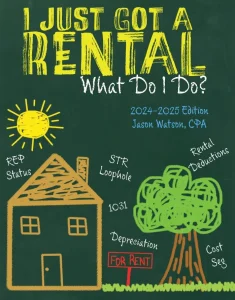
Business Advisory Services
Everything you need to help you launch your new business entity from business entity selection to multiple-entity business structures.
Hey - Our site just had a makeover and we are sorting through the hiccups!
Hey - Our site just had a makeover and we are sorting through the hiccups!

Everything you need to help you launch your new business entity from business entity selection to multiple-entity business structures.

Designed for rental property owners where WCG CPAs & Advisors supports you as your real estate CPA.

Everything you need from tax return preparation for your small business to your rental to your corporation is here.

Posted Monday, May 27, 2024
Table Of Contents
Our Investor Tax Patrol platform is commonly built off of our Keystone Tax Patrol platform for individual tax returns (Form 1040), so bear with us as we dive into that first… and then we will get into the other fun stuff.
If you have a multi-member LLC (partnership) that is a real estate holding company, then we build off of Breck to include both the partnership tax return (Form 1065) and individual tax returns (Form 1040).

Learn how a real estate holding company (the HoldCo) can reduce risk, improve anonymity and help transfer wealth. There are some downsides too!
 We also have Tax Patrol! This is another wonderful tax service for those who don’t need business advisory services or real estate investment support, but from time to time want some love from an experienced tax consultant and business advisor. Have a quick tax question? Need to know the depreciation rules as you buy that new car? Wondering what your April tax bill is going to be in August? Your spouse upgraded to a different job- how is that going to affect things? You received a big bonus- yay, but how will that impact your tax bill?
We also have Tax Patrol! This is another wonderful tax service for those who don’t need business advisory services or real estate investment support, but from time to time want some love from an experienced tax consultant and business advisor. Have a quick tax question? Need to know the depreciation rules as you buy that new car? Wondering what your April tax bill is going to be in August? Your spouse upgraded to a different job- how is that going to affect things? You received a big bonus- yay, but how will that impact your tax bill?
| Keystone | Copper | Breck | |
| Individual Tax Return Prep (Form 1040, joint filing) [more] | |||
| Business Entity Tax Return Prep (Form 1065, 1120, 1120S) [more] | |||
| Household Tax Projection [more] | |||
| Business Tax Projections, PTET Calcs, SALT Workaround [more] | |||
| Estimated Tax Payments Calcs | |||
| Tax Resolution, Audit Defense [more] | Advanced | Advanced | Advanced |
| Complimentary Quick Chats (CQC) [more] | Routine | Routine | Routine |
| Annual Fee* | $1,740 | $2,400 | $3,360 |
| Paid Monthly | $145 | $200 | $280 |
| (prorated based on onboarding date) | |||
Our Copper and Breck Tax Patrol Services platforms do not include reasonable owner salary recommendations and optimization, including 401k, fringe benefit and health insurance matters as they relate to payroll processing. Should you require these services, our Business Advisory platforms (Vail, Telluride, Aspen) above, like way above, might be a better fit.
* Discounts are available if the real estate holding company only has a married couple as members (owners).
On one hand we have our Business Advisory Service plans which are very comprehensive yet might contain some services that not everyone needs such as salary optimization, payroll processing, multiple tax planning events, among other things.
On the other hand we have transactional relationships where clients come in each spring for tax return preparation, and that’s all they need. No questions. No tax planning. Just a pile of tax documents and a few discussions later and bada bing bada boom they have a tax return and a nice summer.
 Is there an in-between? Boom! We have Investor Tax Patrol which is a fancy add-on to our Keystone Tax Patrol platform above.
Is there an in-between? Boom! We have Investor Tax Patrol which is a fancy add-on to our Keystone Tax Patrol platform above.
Investor Tax Patrol is a wonderful tax service for those who don’t need all the advisory bells and whistles, but desire tax planning and, at times, scenario-based decision making assistance from an experienced real estate CPA and tax consultant. Have a quick tax question? Need to know the depreciation rules as you furnish that new short-term rental? Want to kick around Real Estate Professional designation? Wondering what your April tax bill is going to be in August?
Consider these typical fees for a tax-only engagement for rental property tax return preparation. We'll get into an example in a bit-
Here are typical rental property tax prep fees that might be added to your individual tax return (Schedule E reported on Form 1040) or partnership tax return (Form 8825 reported on Form 1065).
Please keep in mind that each rental property is a small business with varying complexity. Operating expenses, improvements, home office deduction including travel, automobile expenses, paying your children, allocated expenses among several rentals among other nuances are business-like considerations and add to the comprehensiveness that WCG provides with rental tax return preparation (learn about our Rental Expert Pod as well).
| Rental Tax Prep, Prepared Financials (Rental Bookkeeping) | $100 ea |
| Rental Tax Prep, Clean DIY Records (The SRO Template) | $150 ea |
| Rental Tax Prep, Complex or Messy Records (disguised disorganization) | $200 ea |
| Add On: Existing Rental converting to STR | $75 |
| Add On: Streamlined State Tax Return (in addition to your resident state) | $125 to $200 |
| Add On: Complex State Tax Return (see below for what makes complex, complex) | $250 to $400 |
| Add On: Cost Seg Setup + 3115 / 481(a) Calc, Existing Rental Prior to 2025 | $625 |
| Add On: Short-Term Rental Activities (non-investor patrol) | $75 |
| Add On: Rental Property Sale | $250 |
| Add On: 1031 Like-Kind Exchange and New Setup | $450 |
| Add On: Complex 1031 (2:1, 1:2) and New Setup(s) | $750 |
As promised, let's get into an example. Let's say you have 2 rentals, with one being a short-term rental in another state.
| Keystone Tax Patrol (as our base) | $1,740 |
| First Rental Included | $0 |
| Second Rental, Short-Term | $175 |
| Streamlined Additional State Tax Return | $125 |
| Annual Fee | $2,040 |
| Monthly | $170 |
Custom! In the past we tried to have a "3 platform" approach to our rental property owners and real estate investors like we do for business advisory and tax patrol above. There is just way too much customization with rentals- one size fits all is great, but rentals are like snowflakes.
 Investor Patrol is specifically designed to give you the freedom to call, text or email us without the worry of being nickeled and dimed like other outdated CPA firms. And! We also provide a tax planning event (usually around May, June and July) where we gather up your financial records like paystubs, rental activities, stock sales, etc. and we create a mock tax return projecting your annual income and eventual tax obligations. We are not big on surprises… bad news in August is palatable, yet bad news on April 15 is unacceptable. Let’s not forget that Investor Patrol also includes IRS audit defense for any tax return that we prepare. Please review our full Investor Patrol Services webpage for all kinds of fine print for your consideration. It’s really not that much.
Investor Patrol is specifically designed to give you the freedom to call, text or email us without the worry of being nickeled and dimed like other outdated CPA firms. And! We also provide a tax planning event (usually around May, June and July) where we gather up your financial records like paystubs, rental activities, stock sales, etc. and we create a mock tax return projecting your annual income and eventual tax obligations. We are not big on surprises… bad news in August is palatable, yet bad news on April 15 is unacceptable. Let’s not forget that Investor Patrol also includes IRS audit defense for any tax return that we prepare. Please review our full Investor Patrol Services webpage for all kinds of fine print for your consideration. It’s really not that much.
Also, please check out our rental property book titled I Just Got A Rental, What Do I Do? This is our second book. Our first book, Taxpayer’s Comprehensive Guide to LLCs and S Corps, was first published in 2014 and was well-received by small business owners and tax professionals, so we thought a book on rental properties and real estate investments would be equally helpful. So, here we are with our second iteration, or the 2025 edition. We plan to update annually.
With our Investor Patrol Services, everyone is a snowflake. Each real estate deal is unique, right? Each real estate investor is also unique. The above Investor Patrol Service plans are our attempt to give you an idea of the value proposition. Here are some pre-launch things we need to sort through-
Why do we have setup fees at all? We must ensure your prior depreciation is correct (especially if acquired with a 1031 exchange), all assets are correctly identified with original cost basis including acquisition costs, and loan amortization is properly recorded. We see a lot of junk out there which is not big deal until you want to sell the rental property, and minimize your tax pain.
Why do we charge extra for short-term rental setups? They are more intensive because there are more questions that need to be answered from us (and from you!), and we have to comb through furnishings and other boot up expenditures to ensure they are properly handled.
Why would I need a 3115 with a cost segregation study? If your rental property has already been in service and tax returns have been filed, then we need to request permission from the IRS to basically accelerate your depreciation on your current tax return. Alternatively we could amend your prior tax returns which is messy and expensive. Also, there is some tax arbitrage potentially if your income is higher today than it was when you first purchased your rental property. Lots to discuss here!
Why do we charge extra for a rental property acquired in a prior year 1031 like-kind exchange? We need to confirm that the previous tax professional computed the exchange correctly since once we prepare the tax return, we own the data including prior data.

You live in Colorado and have a rental property in California. You will need to file a California non-resident tax return even if the rental loses money. You have an income-generating asset in their state. Also, please consider that a taxing jurisdiction has the right to inspect your books and records to ensure your loss is truly a loss.
Keep in mind that some states and cities consider rental properties to be business ventures like any other, and more are focusing on short-term rentals as well. What makes things worse is that some taxing jurisdictions will impose an income tax based on gross rental receipts regardless if the activity is profitable. Yuck.
Here is some other complexity-
While we have your attention or perhaps even your interest, please read our State Problems With Your Rental Property section from our book “I Just Got A Rental, What Do I Do?”
These fees assume a 1040 tax return filing. At times, reporting your rental activities on a partnership tax return (Form 1065) might be a good idea to lower audit rate risk and mechanically show at-risk basis in the assets. Should a partnership exist such as a multi-member LLC owning rental properties that would be an add-on fee as shown above. (see our fee page for partnerships).
 Here are some additional considerations during rental property tax return preparation.
Here are some additional considerations during rental property tax return preparation.
How does all this black magic work? With a cost segregation report, or some say a cost segregation study, all the sticks, bricks and stuff inside are figuratively torn down and put into different piles. Some piles (5-year or 7-year) are eligible for accelerated depreciation, another pile would be a 15-year pile which varies a bit, and the remaining pile will revert to the 27.5- or 39.0-year typical residential or nonresidential commercial use depreciation.
Technically, and with full-on geek-speak, cost segregation separates property elements that are “dedicated, decorative or removable” from those that are “necessary and ordinary for operation and maintenance of the building.” These piles are called asset classes, and they are maintained separately within your property’s depreciation schedule.
From there, and with the help of bonus depreciation and in some cases Section 179 expensing, you compress the multiple years of depreciation into one. Yay!
If your average guest stay is 7 days or less and you materially participate in the activity (500 hours, 100 hours and more than anyone else, or substantially all hours) you likely qualify for the short-term rental loophole. Given the intricacies with STRs, and additional time and diligence spent, we commonly have an add-on fee for these types of rental properties. We are short-term rental experts.
When you sell your rental property, including a 1031 or 721 exchange (don’t forget about Delaware Statutory Trusts), there will likely be an add-on fee of $250 for a straight-up sale or $500 to $750 for a like-kind exchange. This is where the rubber hits the road in terms of capital gains, and we need to spend the extra time to ensure a) your purchase price is correctly being considered including acquisition costs, b) improvements are accounted for and c) selling expenses and other things are factored in.
Our approach to starting off this relationship with you is to comprehensively understand your needs and objectives, and then design a malleable system as needed. Additionally, the following activities are considered out of scope and might incur a separate fee-
If we believe the requested service is outside of scope and not included in the Investor Patrol Services, we will have that awkward conversation with you ahead of time so an agreement can be reached. We will never do work and then bill you without an estimate of time from us and approval from you. In other words… ask away! It is up to us to pump the brakes with a “umm… yeah… can we chat about what’s involved for a bit first?”
The button below is a sample proposal for our real estate Investor Tax Patrol Service.
 WCG CPAs & Advisors specializes in small businesses who generally have fewer than 25 employees. Why? We want to help people, and more importantly we want to help the business owner directly. Frankly speaking, once a business gets to a certain size management layers get in the way of owner access. Access allows us to ensure the owner(s) are leveraging the most out of their business for themselves and their families.
WCG CPAs & Advisors specializes in small businesses who generally have fewer than 25 employees. Why? We want to help people, and more importantly we want to help the business owner directly. Frankly speaking, once a business gets to a certain size management layers get in the way of owner access. Access allows us to ensure the owner(s) are leveraging the most out of their business for themselves and their families.
Because small business is a core competency for us, we have created Business Advisory Service platforms which include these really cool things-
Vail | Telluride | Aspen | |
Compliance & Preparation | |||
| Business Entity Tax Return (Form 1065, 1120, 1120S) [more] | |||
| Business Tax Projections (Franchise, Privilege, Receipts) | |||
| Individual Tax Return (Form 1040, joint filing) [more] | |||
| Tax Return Review Meeting | |||
| Tax Resolution, Audit Defense [more] | Advanced | Advanced | Advanced |
| State Income Apportionment, Nexus [more] | Add-On | Add-On | Add-On |
| Expat / Foreign Income Filings (FBAR, 8938) [more] | Add-On | Add-On | Add-On |
Strategic Tax Planning | |||
| Tax Advisory, Tax Reduction, Business Reviews [more] | 2 Sessions | 2 Sessions | Custom |
| Pre-Planning Meeting (May/Jun) | |||
| Household Tax Projections [more] | |||
| Business PTET Optimization [more] | |||
| Payroll Planning, Optimization [more] | |||
| Reasonable Shareholder Salary Calculation (RCReports) | |||
| Tax Projections Review Meeting (Jul/Aug) | |||
| Section 199A Deduction Optimization [more] | |||
| Small Business Tax Deductions Optimization [more] | |||
| Estimated Income Tax Calcs (via Payroll) [more] | |||
| End of Year Wrap-Up Meeting (Oct/Nov) [more] | |||
| Situational Tax Law Research (up to 3 hours) | |||
Payroll & Accounting | |||
| Monthly Shareholder Payroll Processing[more] | DIY | DIY | DIY |
| Quarterly QuickBooks Consulting (QuickStart) [more] | Add-On | Add-On | |
| Accounting Services (Bookkeeping + Analysis) [more] | Add-On | Add-On | Add-On |
| Financial Statement Review [Reach Reporting] | Inc with AST | Inc with AST | Inc with AST |
Business Advisory & Support | |||
| Periodic Quick Chats (May-Nov) [more] | 3 Chats | 3 Chats | Routine |
| Interfacing with Lenders, Attorneys, Planners | Add-On | Routine | Routine |
| CPA Concierge Services [more] | Add-On | Add-On | |
| Financial Analysis (Cash Flow, Budgeting, KPIs) | |||
| Annual Corporate Governance (Resolutions) | Add-On | Add-On | |
| Annual Fee* | $4,500 | $4,980 | Custom |
| Paid Monthly | $375 | $415 | Custom |
| (prorated based on onboarding date) | |||
The primary difference between Vail and Telluride is business entity tax projections which focuses on state-level taxes such as franchise taxes and pass-through entity tax calculations. See below for more details.
Custom! Unlike the modern day new car packages where you have to spend $8,000 for the moonroof, our Business Advisory Service plans can be customized specifically for you. The array above is simply a starting point. If you need more or less from us, let’s chat about it!
Fees Updated! Our Business Advisory, Investor Patrol and Tax Patrol Service fees were updated August 2024, and we usually hold fees for at least two years (or through December 31, 2026) unless inflation skyrockets back to 9%.
Yeah, we all dislike the little asterisk. The gotcha! The fine print! Well, here is one of those situations. Tax projections under our Vail platform does not include business-entity tax projections and payments (California’s Franchise Tax, New Jersey’s BAIT, Portland’s overall madness, NYC, etc.), pass-through entity tax (PTET) calculations and payments, among other things. Not every business entity needs separate tax projections or planning! Texas, No. California, Yes.
Please see our Tax Planning Services page and Master Service Agreement for more information.Our Telluride Business Advisory plan includes entity specific tax projections as we just described plus interfacing with lenders, attorneys and financial planners (yawn). Here is a quickie listing of our tax planning service levels-
Afraid of bait and switch? Yeah, we think that stinks too. Our annual fee for Vail, as an example, is $4,500. What can make this fee go up? The most prominent reason is additional state tax returns (taxing jurisdictions). However, we will detail that in your proposal. Please see our individual and business entity tax return preparation pages for more information.
Quarterly financial statements analysis is an add-on service, however it is included automatically if you use our accounting services.
 We also have Tax Patrol! This is another wonderful tax service for those who don’t need business advisory services or real estate investment support, but from time to time want some love from an experienced tax consultant and business advisor. Have a quick tax question? Need to know the depreciation rules as you buy that new car? Wondering what your April tax bill is going to be in August? Your spouse upgraded to a different job- how is that going to affect things? You received a big bonus- yay, but how will that impact your tax bill?
We also have Tax Patrol! This is another wonderful tax service for those who don’t need business advisory services or real estate investment support, but from time to time want some love from an experienced tax consultant and business advisor. Have a quick tax question? Need to know the depreciation rules as you buy that new car? Wondering what your April tax bill is going to be in August? Your spouse upgraded to a different job- how is that going to affect things? You received a big bonus- yay, but how will that impact your tax bill?
| Keystone | Copper | Breck | |
| Individual Tax Return Prep (Form 1040, joint filing) [more] | |||
| Business Entity Tax Return Prep (Form 1065, 1120, 1120S) [more] | |||
| Household Tax Projection [more] | |||
| Business Tax Projections, PTET Calcs, SALT Workaround [more] | |||
| Estimated Tax Payments Calcs | |||
| Tax Resolution, Audit Defense [more] | Advanced | Advanced | Advanced |
| Complimentary Quick Chats (CQC) [more] | Routine | Routine | Routine |
| Annual Fee* | $1,740 | $2,400 | $3,360 |
| Paid Monthly | $145 | $200 | $280 |
| (prorated based on onboarding date) | |||
Our Copper and Breck Tax Patrol Services platforms do not include reasonable owner salary recommendations and optimization, including 401k, fringe benefit and health insurance matters as they relate to payroll processing. Should you require these services, our Business Advisory platforms (Vail, Telluride, Aspen) above, like way above, might be a better fit.
On one hand we have our Business Advisory Service plans which are very comprehensive yet might contain some services that not everyone needs such as salary optimization, payroll processing, multiple tax planning events, among other things.
On the other hand we have transactional relationships where clients come in each spring for tax return preparation, and that’s all they need. No questions. No tax planning. Just a pile of tax documents and a few discussions later and bada bing bada boom they have a tax return and a nice summer.
 Is there an in-between? Boom! We have Investor Tax Patrol which is a fancy add-on to our Keystone Tax Patrol platform above.
Is there an in-between? Boom! We have Investor Tax Patrol which is a fancy add-on to our Keystone Tax Patrol platform above.
Investor Tax Patrol is a wonderful tax service for those who don’t need all the advisory bells and whistles, but desire tax planning and, at times, scenario-based decision making assistance from an experienced real estate CPA and tax consultant. Have a quick tax question? Need to know the depreciation rules as you furnish that new short-term rental? Want to kick around Real Estate Professional designation? Wondering what your April tax bill is going to be in August?
Consider these typical fees for a tax-only engagement for rental property tax return preparation. We'll get into an example in a bit-
Here are typical rental property tax prep fees that might be added to your individual tax return (Schedule E reported on Form 1040) or partnership tax return (Form 8825 reported on Form 1065).
Please keep in mind that each rental property is a small business with varying complexity. Operating expenses, improvements, home office deduction including travel, automobile expenses, paying your children, allocated expenses among several rentals among other nuances are business-like considerations and add to the comprehensiveness that WCG provides with rental tax return preparation (learn about our Rental Expert Pod as well).
| Rental Tax Prep, Prepared Financials (Rental Bookkeeping) | $100 ea |
| Rental Tax Prep, Clean DIY Records (The SRO Template) | $150 ea |
| Rental Tax Prep, Complex or Messy Records (disguised disorganization) | $200 ea |
| Add On: Existing Rental converting to STR | $75 |
| Add On: Streamlined State Tax Return (in addition to your resident state) | $125 to $200 |
| Add On: Complex State Tax Return (see below for what makes complex, complex) | $250 to $400 |
| Add On: Cost Seg Setup + 3115 / 481(a) Calc, Existing Rental Prior to 2025 | $625 |
| Add On: Short-Term Rental Activities (non-investor patrol) | $75 |
| Add On: Rental Property Sale | $250 |
| Add On: 1031 Like-Kind Exchange and New Setup | $450 |
| Add On: Complex 1031 (2:1, 1:2) and New Setup(s) | $750 |
As promised, let's get into an example. Let's say you have 2 rentals, with one being a short-term rental in another state.
| Keystone Tax Patrol (as our base) | $1,740 |
| First Rental Included | $0 |
| Second Rental, Short-Term | $175 |
| Streamlined Additional State Tax Return | $125 |
| Annual Fee | $2,040 |
| Monthly | $170 |
Custom! In the past we tried to have a "3 platform" approach to our rental property owners and real estate investors like we do for business advisory and tax patrol above. There is just way too much customization with rentals- one size fits all is great, but rentals are like snowflakes.
 Investor Patrol is specifically designed to give you the freedom to call, text or email us without the worry of being nickeled and dimed like other outdated CPA firms. And! We also provide a tax planning event (usually around May, June and July) where we gather up your financial records like paystubs, rental activities, stock sales, etc. and we create a mock tax return projecting your annual income and eventual tax obligations. We are not big on surprises… bad news in August is palatable, yet bad news on April 15 is unacceptable. Let’s not forget that Investor Patrol also includes IRS audit defense for any tax return that we prepare. Please review our full Investor Patrol Services webpage for all kinds of fine print for your consideration. It’s really not that much.
Investor Patrol is specifically designed to give you the freedom to call, text or email us without the worry of being nickeled and dimed like other outdated CPA firms. And! We also provide a tax planning event (usually around May, June and July) where we gather up your financial records like paystubs, rental activities, stock sales, etc. and we create a mock tax return projecting your annual income and eventual tax obligations. We are not big on surprises… bad news in August is palatable, yet bad news on April 15 is unacceptable. Let’s not forget that Investor Patrol also includes IRS audit defense for any tax return that we prepare. Please review our full Investor Patrol Services webpage for all kinds of fine print for your consideration. It’s really not that much.
Also, please check out our rental property book titled I Just Got A Rental, What Do I Do? This is our second book. Our first book, Taxpayer’s Comprehensive Guide to LLCs and S Corps, was first published in 2014 and was well-received by small business owners and tax professionals, so we thought a book on rental properties and real estate investments would be equally helpful. So, here we are with our second iteration, or the 2025 edition. We plan to update annually.

We publish our typical fees, but then again they are scattered across several pages and sections of our website. Click below for a consolidated no thrills fee table that combines all our various fees for tax return preparation, tax resolution, accounting services, payroll processing and business services into a simple one pager (you might have to scroll a bit).
Here are some quickie FAQs to learn more about WCG CPAs & Advisors, and how we do business-
Nope. We have a t-shirt that reads, “Hate extensions. Love our summers.” We file 70% of our tax returns by April 15, and only extend per the client’s request or if there is missing data such as a rogue K-1. We’ll go as quickly as you let us! Also, we don’t have A listers… we prepare tax returns in first-in first-out sequence. Sure, we leave room for emergencies or other issues that allow for jumping the line.
Good question! Our Business Advisory Service plans (Vail, Telluride and Aspen) are more advisory forward like a robust old-fashioned with lots of planning, tax strategies and business consultation to help you make decisions. Our Tax Patrol Services (Keystone, Copper and Breck) are more tax return preparation forward like a refreshing vodka-lemonade with less tax planning, or at least less-intensive planning and consultation.
Investor Patrol Services for our rental property owners and investors is somewhere in-between since real estate is a business like any other requiring more tax planning, strategy and consultation but falls short of needing shareholder payroll planning and processing.
 How Often Do We Schedule Meetings?
How Often Do We Schedule Meetings?Up to you, but within a structured framework! In the past, we tried rigid quarterly meetings, but they often felt like a chore for everyone. Then went full tilt the other way with a "call us anytime" approach. Duds on both sides.
Today, we operate on a 'Rhythm of the Relationship' model.
For Business Advisory clients, we generally connect about 8 times a year. This is a mix of strategic milestones where we reach out to you (Pre-Planning, Projections, Year-End Wrap-Ups) and On-Demand Support where you reach out to us (Tax Return Reviews, Advisory Sessions, and Scheduled Periodic Quick Chats). We provide the structure to keep you safe, but your goal is to use the on-demand access to extract everything you need.
And our Tax Patrol including Investor Patrol engagements can expect core strategic coverage including tax return reviews, pre-planning meeting, and tax projections, plus access to the same quick chats when life happens.
We prefer scheduled meetings over Teams. Check out our CPA Concierge Service as well. Priority boarding. HOV lane. Early check-in.
We rely heavily on emails and text message alerts. However, we do not have an allergy to the telephone. During friendly hours (let’s say 8AM to 7PM including weekends) we will usually call first if we have a question or need clarification.
Having said that, email can be an effective communication tool, and it is especially good for questions that require thought and good for memorializing conversations. While email is a chore for most people it can also be a distraction. Your WCG team is no different.
As such, we have two big rules that you need to be aware of-
When we have our amazingly productive and efficient conversation via Teams or phone call, we will always send a recap email to memorialize all the goodies. This recap email also gets captured by our workflow software allowing all other team members to view the recap as necessary.
For tax, we have two-person teams so there is always a backup. Teams are assigned based on who first spoke with you, bandwidth and subject matter expertise. We also have accounting, payroll and business formation / governance. As such, you might have 4 people you work with. Yay! The two tax peeps, and if applicable, a payroll peep to help with setup and training, and an accounting peep (if you are using our Accounting Services team for bookkeeping + analysis). We also have dedicated Client Support and Tax Support teams to… well… support you and the other teams.
Are you interested in business advisory services? Just tax return preparation? Do you own a rental property and need assistance? Let's chat!

Let's schedule a 20-minute discovery meeting with one of our Partners or Senior Tax Professionals to understand your tax footprint and objectives, and how WCG CPAs & Advisors might help.

Taxes can be tricky. Chat with a WCG human now and get questions answered.
Our accounting services go beyond simple data entry by pairing professional bookkeeping with high-level financial analysis to help you understand exactly where your business is headed. Whether you are an S Corp owner or a real estate investor, we provide the "defensive" accounting needed to protect your tax deductions and ensure your books are always tax-ready- planning or preparation!
| Monthly Accounting (bookkeeping + analysis) [more] | starting at $525 per month |
| Bi-Monthly Accounting (bookkeeping + analysis every 2 months) | starting at $280 per month |
| Quad-Monthly Accounting (bookkeeping + analysis every 4 months) | starting at $190 per month |
| Annual Compliance Bookkeeping For Tax Return Prep [more] | typically $1,200 annually |
| Annual Accounting | starting at $1,800 annually |
| Rental Property Bookkeeping [more] | starting at $1,200 annually |
| Sales Tax | typically $75 per month, or typically $150 per quarter |
| Personal Property Tax | typically $40 per month, or starting at $500 annually |
Fine Print: Starting accounting service fees are based on 2 bank accounts (one checking account and one credit card is 2 accounts) with less than 250 monthly transactions. Our fee does not include the QBO subscription fee from Intuit. Custom quote is available if you have a lot going on such as third-party integrations (POS, time billing system), accrual accounting method, extensive benefits packages and / or industry specific issues (e.g, job costing in construction). The first step for Accounting Services is to do an accounting assessment with one of our experts to determine scope, service level and ultimate fee (see button below).
The following are additional business services to get your venture launched and on the way. Some of these are teased out separately as one and done fees like formation and onboarding stuff.
Business Formation | |
| Articles of Organization or Incorporation, or Dissolution | $625 + state filing fee |
| Initial Report (if required) | $125 + state filing fee |
| Annual Report | $350 + state filing fee |
| Employer Identification Number (EIN) | Included |
| Single Member Operating Agreement (SMLLC) | Included |
| MS Word Templated Bylaws Agreement (Corporations) | Included |
| S Corp Election, Timely Election (made with formation) | Included |
| Accountable Plan | Included |
Onboarding Fees (one and done) | |
| Payroll Accounts Setup, Transfer, Closing | $550 to $650 depending on state |
| Payroll Quick Launch, Account Setup | $950 to $1,050 depending on state |
| Accounting Setup or Transfer (Fractional Controller) [more] | Varies |
| QuickStart, QuickBooks Setup and Support (90 days) [more] | $750 |
| S Corp Election, Timely Election (within 75 days) | $450 |
| Late S Corp Election Back to January 2024 [more] | $600, $1,200 after Jan 1 2024* |
| Examine Prior Tax Return | Included |
For late S Corp elections back to January, we have a split fee of $600 or $1,200… and it depends on if we can file your S Corp by March 15. Ideally, we attach the late S Corp election to the tax return and file both electronically. Yay! Conversely, if we cannot file on March 15, we also cannot electronically extend the tax return. As such, when we file in June or July, it is now considered late. We can usually have the penalties abated, but it takes effort hence the additional $600 fee (the $600 v. $1,200). Be a hero, and get us your stuff right away to save a few bucks and trim down the anxiety.
Business Maintenance | |
| Entity Relocation Package (payroll closure and opening, entity move) [more] | $800 (some are $1,050) + state filing fees |
| Address Changes w/o Payroll (IRS, State Dept of Revenue, Secretary of State) | $250 + state filing fees |
| Address Changes with Payroll (above + state and local payroll agencies) | $350 to $450 + state filing fees |
Our entity relocation package includes closing your current payroll accounts, opening shiny new ones, moving your entity with the Secretary of State (if applicable) and updating addresses as necessary.
Speaking of address changes… these are tough. Basic address changes require IRS, State Department of Revenue and Secretary of State notifications. Address changes that include payroll add another level of complexity since departments of revenue are not the same as departments of labor, and there might be local or municipal agencies as well.
WCG’s advisory engagements are billed on an annualized basis and are tied to defined deliverables and scheduled advisory touchpoints. These typically include tax return preparation and review, a pre-planning meeting, a tax projection deliverable and review, and periodic scheduled quick chats (May to Nov). Our Business Advisory Services (BAS) engagements also include tax advisory meetings and an end-of-year wrap-up meeting. Because these services are scheduled and delivered over the course of the year, our annual advisory fee does not fluctuate based on when individual services are used or delivered.
When an engagement begins partway through the year, the total annual fee is prorated over the remaining months of the year. As a result, the monthly billing amount will be higher, even though the annual fee itself remains unchanged and reflects the full scope of advisory work to be delivered.
Beginning in August, WCG no longer bundles tax return preparation into new annual advisory engagements. Frankly, bundling everything into a single monthly number can look unusually high and distract from the actual year-round planning work we deliver. Instead, advisory services will be structured as a custom annual fee covering the remaining or needed planning and advisory work, including pre-planning meetings, tax projections and reviews, tax advisory meetings, periodic scheduled quick chats, and an end-of-year wrap-up meeting.
Tax return preparation including review will be invoiced separately at the time the tax return is prepared, typically during the following tax season. This structure more closely aligns advisory fees with year-round planning work and separates compliance services that occur at a different point in time.
WCG has shifted payroll to a setup-and-planning model. Ongoing payroll processing is not sustainable at the market price point for a CPA firm, and this change allows our tax advisors to focus on higher-impact tax planning and strategy for clients. It also allows our team to spend more time on tax return optimization. In short, we are doubling down on what we do best.
We continue to support payroll through proper account setup, training, and payroll planning, while ADP handles the compliance engine, including calculations, filings, deposits, and year-end forms. This approach provides clients with flexibility and control while ensuring payroll is handled correctly. Learn more here.
You can prepare your own individual tax return as well… but the benefit of WCG preparing both individual and business tax returns is that we can slide things around depending on income limitations, phaseouts, Section 199A deduction optimization, pass-through entity tax deductions (PTET), etc. Having our arms around both worlds can create real tax savings!
Note: An individual tax return is what the IRS calls Form 1040 and refers to the entity filing the tax return (you, the individual, are the entity). However, a married couple are deemed to be one entity for the sake of an individual tax return. So, when we say we will prepare your individual tax return, it is meant to include your spouse in a jointly filed happy happy joy joy tax return.
Break-even analysis is based on our annual advisory fee of $4,500 for our Vail package plus the expected cost of you processing your payroll through ADP of around $900. If an S corporation saves you 8% to 10% (on average) in taxes over the garden-variety LLC, then $5,400 divided by 9% equals $60,000 of net ordinary business income (profit) after expenses and deductions.
This doesn’t factor in the lower audit rate of S Corps versus Schedule C activities, plus the ability to use business funds to pay for your state income taxes otherwise known as the Pass-Thru Entity Tax Deduction (PTET) or the great SALT workaround.
More sales pitch! Keep in mind that our fee of $4,500 includes your individual tax return which you might already be paying another tax professional to prepare. WCG CPAs & Advisors has a handful of clients who are right at the break-even point of $60,000 but leverage an S Corp and our services to get tax return preparation, tax strategies and consultation.
We are not salespeople. We are not putting lipstick on a pig, and trying to convince you to love it, even if Tom Ford’s Wild Ginger looks amazing. Our job remains being professionally detached, giving you information and letting you decide.
 Moreover, many CPAs and tax professionals thrust their risk aversion onto their clients. This is bad. At WCG CPAs & Advisors we must perform our due diligence and hurdle our ethical and professional standards. However, after those gymnastics we present a risk-based analysis to the tax return and let you, the client and taxpayer, decide how to proceed. Having said that, we don’t entertain tax scammers or those who can take down the ship. Arthur Anderson anyone? No thanks.
Moreover, many CPAs and tax professionals thrust their risk aversion onto their clients. This is bad. At WCG CPAs & Advisors we must perform our due diligence and hurdle our ethical and professional standards. However, after those gymnastics we present a risk-based analysis to the tax return and let you, the client and taxpayer, decide how to proceed. Having said that, we don’t entertain tax scammers or those who can take down the ship. Arthur Anderson anyone? No thanks.
We also see far too many crazy schemes and half-baked ideas from attorneys and wealth managers. In some cases, they are good ideas. In most cases, all the entities, layering and mixed ownership is only the illusion of precision. Just because you can complicate the crap out of your life doesn’t mean you must. Just like Chris Rock says, just because you can drive your car with your feet doesn’t make it a good idea.
Here is a brief summary of the next steps should you want to engage WCG with Business Advisory Services or Tax Patrol-
 As mentioned elsewhere we primarily focus on small business owners and real estate investors, and their unique consultation and tax preparation needs. With over 90 full-time consultation professionals including Certified Public Accountants, Enrolled Agents and Certified Financial Planners on your team, WCG CPAs & Advisors consults on custom business structures, multiple entity arrangements, S corp elections (even late S corp elections back to January), tax strategies, business coaching, industry analysis, executive benefits, retirement planning including individual 401k plans, exit strategies, business valuations, income tax planning and modeling, and tax representation.
As mentioned elsewhere we primarily focus on small business owners and real estate investors, and their unique consultation and tax preparation needs. With over 90 full-time consultation professionals including Certified Public Accountants, Enrolled Agents and Certified Financial Planners on your team, WCG CPAs & Advisors consults on custom business structures, multiple entity arrangements, S corp elections (even late S corp elections back to January), tax strategies, business coaching, industry analysis, executive benefits, retirement planning including individual 401k plans, exit strategies, business valuations, income tax planning and modeling, and tax representation.
We also work with business law attorneys for business owners who have additional needs such as drafting Operating Agreements, fee for service contracts, buying or selling a business including employee stock ownership plans and partner buy-ins. In addition, WCG coordinates with third party plan administrators create age-based profit sharing plans and cash balance (defined benefit) plans. We can run point on whatever your business needs to ensure that communication is effective and efficient allowing you to sell widgets.
Here are some additional resources you might find useful.
Jason Watson, CPA, CVA is trained by the American Institute of CPAs and the National Association of Certified Valuation Analysts (CVA) for Business Valuation. Jason has represented several buyers and sellers in business acquisitions, and has helped divorcing couples value a small business for divorce property settlements. When performing business consultation and business valuation services under engagement, his hourly fee is $350 with a retainer of $5,000 to $8,000 depending on the complexity of the case. Depositions and trial testimony are $450 per hour (possibly with an additional retainer).
We also have a short list of additional fees that might be incurred depending on your tax and accounting situation, and your level of readiness-
Various Things | |
| Copying and returning of original tax documents | $45 |
| Significant changes or additions after a preliminary tax return is prepared- “crud, let me re-work all my numbers.” | $250 / hr |
| Tax resolution and/or audit assistance; Resolution is typically 2 hours; audit assistance is typically two 2-hour sessions | $375 / hr |
| Lender or “comfort” letters | $250 to $600 |
| Business Valuations | $5,000 – $8,000 retainer, $350 / hr |
| Divorce Analysis, Litigation Support | $250 / hr, $350 / hr for court |
| Client Support, Administrative billable rate | $150 / hr |
| Accountant billable rate | $150 / hr |
| Supervisor billable rate | $250 / hr |
| Manager billable rate | $300 / hr |
| Partner billable rate | $400 / hr |
| Managing Partner billable rate | $450 / hr |
| Senior Partner billable rate | $475 to $525 / hr |
Wow! We really belabored the heck out of those hourly rates there at the end, didn’t we? All in the interest of tax preparation fee transparency of a growing firm.
Also! Please keep in mind that we pride ourselves in not being the nickel and dime type of tax and accounting firm. Typically, we can offer a fee range or a maximum limit for our services and fees to keep your tax prep cost where you want it. This is what we do all day, every day! We have a solid understanding of what it takes to complete a project successfully.
WCG CPAs & Advisors is a full-service yet boutique progressive tax, accounting and business consultation firm located in Colorado serving clients worldwide.
Table Of Contents

Tax planning season is here! Let's schedule a time to review tax reduction strategies and generate a mock tax return.

Tired of maintaining your own books? Seems like a chore to offload?
Did you want to chat about this? Do you have questions about Investor Tax Patrol Services? Let’s chat!
The tax advisors, business consultants and rental property experts at WCG CPAs & Advisors are not salespeople; we are not putting lipstick on a pig expecting you to love it. Our job remains being professionally detached, giving you information and letting you decide within our ethical guidelines and your risk profiles.
We see far too many crazy schemes and half-baked ideas from attorneys and wealth managers. In some cases, they are good ideas. In most cases, all the entities, layering and mixed ownership is only the illusion of precision. As Chris Rock says, just because you can drive your car with your feet doesn’t make it a good idea. In other words, let’s not automatically convert “you can” into “you must.”
Let’s chat so you can be smart about it.
We typically schedule a 20-minute complimentary quick chat with one of our Partners or our amazing Senior Tax Professionals to determine if we are a good fit for each other, and how an engagement with our team looks. Tax returns only? Business advisory? Tax strategy and planning? Rental property support?

Everything you need to help you launch your new business entity from business entity selection to multiple-entity business structures.

Designed for rental property owners where WCG CPAs & Advisors supports you as your real estate CPA.

Everything you need from tax return preparation for your small business to your rental to your corporation is here.


